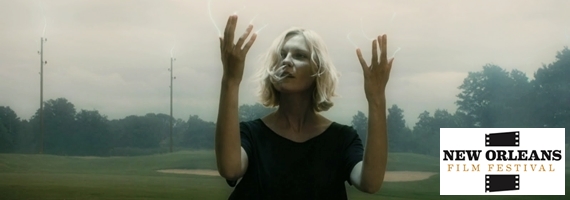Melancholia starts the film by destroying your hopes of a happy ending with an awe-inspiring display of slow motion destruction coupled with a score that makes for a film opening that could rival any scene from 2001: A Space Odyssey. Knowing how the film ends up front doesn’t take away from the film, but only adds to the levels of deep despair and depression that this film crawls through. It begins at Justine’s (Kirsten Dunst) wedding. After a few minutes, we can tell something is off about her. Through a few mumbles and murmurs throughout the family, we realize she suffers from a crippling depression-like mental state. The relationship she has with the rest of her family, and some co-workers, is explored throughout the wedding and only adds to the mystery and tragedy of her character. Her tired savior, sister Claire (Charlotte Gainsbourg) pains away at helping her through the night to the end of the wedding, while her patient husband, Mike (Alexander Skarsgard) slowly loses his grip and ends up leaving before the honeymoon begins. That leaves Justine and Claire together for the weekend with Claire’s son and husband (Keifer Sutherland). They soon discover a planet in the sky and slowly realize the planet is headed straight for earth. With days left, their relationship nosedives from bad to worse and ends the way it began.
When I heard Lars Von Trier had a new film coming out, I was very interested. I’ve talked about his film AntiChrist on the podcast before and how I oddly enjoyed it, and since I’ve started to familiarize myself with his repertoire. I can safely say, this film is his most beautiful to look at to date. It’s overflowing with gorgeous scenery and fantastic slow motion shots. The performances of Dunst, Gainsbourg, and Sutherland are solid and nearly captivating, but something stops it from becoming truly incredible. The writing. Von Trier really dropped the ball with this film delivering some of the most uninspired dialogue I’ve heard in years. What’s supposed to be a dramatic and heartbreaking dissection of a family at the end of existence, takes itself too seriously and the dialogue comes across as B-Movie camp sprinkled with corny quips. There were times I was moved, only to have it taken away a mere seconds later. Many people felt the same by breaking into laughter at times when there should have been silence or the sounds of soft sobs. The soundtrack only added to the camp. As beautiful as it was, ‘Tristan und Isolde: Prelude’ was played over and over and over. Granted only selections were played at points, but after a while, it takes away from the film. Maybe having an original piece would have helped, but even then, playing it over and over and over would have only hurt it.
This was probably the most crowded screening I was at and easily the most anticipated film of the festival. The reactions during the films were light scoffs and audible laughs, all at moments that should have been filled with beautiful silence or soft sobs (like I mentioned earlier). When the film ended, many sighed with relief proclaiming it was the best movie of the year, while an equal amount booed the film referring to it as “garbage” and “the worst movie I’ve ever seen”. As for me, there were too many flaws to truly enjoy what could have been a masterpiece.





